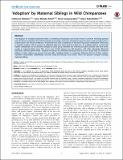Files in this item
‘Adoption’ by maternal siblings in wild chimpanzees
Item metadata
| dc.contributor.author | Hobaiter, Cat | |
| dc.contributor.author | Schel, Anne Marijke | |
| dc.contributor.author | Langergraber, Kevin | |
| dc.contributor.author | Zuberbuehler, Klaus | |
| dc.date.accessioned | 2014-08-05T15:31:01Z | |
| dc.date.available | 2014-08-05T15:31:01Z | |
| dc.date.issued | 2014-08-01 | |
| dc.identifier.citation | Hobaiter , C , Schel , A M , Langergraber , K & Zuberbuehler , K 2014 , ' ‘Adoption’ by maternal siblings in wild chimpanzees ' , PLoS ONE , vol. 9 , no. 8 , e103777 . https://doi.org/10.1371/journal.pone.0103777 | en |
| dc.identifier.issn | 1932-6203 | |
| dc.identifier.other | PURE: 138010159 | |
| dc.identifier.other | PURE UUID: 00ce4d90-9624-46e8-a615-e54cb6b16beb | |
| dc.identifier.other | Scopus: 84905460335 | |
| dc.identifier.other | ORCID: /0000-0002-3893-0524/work/46125066 | |
| dc.identifier.other | WOS: 000339819800078 | |
| dc.identifier.other | ORCID: /0000-0001-8378-088X/work/64360647 | |
| dc.identifier.uri | https://hdl.handle.net/10023/5087 | |
| dc.description | This research was funded by the Leverhulme Trust Research Leadership Award F/00268/AP (http://www.leverhulme.ac.uk/), a Wenner-Gren Foundation Dissertation Fieldwork grant (http://www.wennergren.org/), the British Academy Grant SG411998 (http://www.brit.ac.uk) and the Royal Zoological Society of Scotland (http://www.rzss.org.uk). This project has received funding from the European Union’s Seventh Framework Programme for research, technological development and demonstration under grant agreement no. 283871. Genetic analyses were funded by the Max Planck Society, Boston University, and the Leakey Foundation. | en |
| dc.description.abstract | The adoption of unrelated orphaned infants is something chimpanzees and humans have in common. Providing parental care has fitness implications for both the adopter and orphan, and cases of adoption have thus been cited as evidence for a shared origin of an altruistic behaviour. We provide new data on adoptions in the free-living Sonso chimpanzee community in Uganda, together with an analysis of published data from other long-term field sites. As a default pattern, we find that orphan chimpanzees do not become adopted by adult group members but wherever possible associate with each other, usually as maternal sibling pairs. This occurs even if both partners are still immature, with older individuals effectively becoming ‘child household heads’. Adoption of orphans by unrelated individuals does occur but usually only if no maternal siblings or other relatives are present and only after significant delays. In conclusion, following the loss of their mother, orphaned chimpanzees preferentially associate along pre-existing social bonds, which are typically strongest amongst maternal siblings. | |
| dc.format.extent | 6 | |
| dc.language.iso | eng | |
| dc.relation.ispartof | PLoS ONE | en |
| dc.rights | © 2014 Hobaiter et al. This is an open-access article distributed under the terms of the Creative Commons Attribution License (http://creativecommons.org/licenses/by/4.0/), which permits unrestricted use, distribution, and reproduction in any medium, provided the original author and source are credited. | en |
| dc.subject | QL Zoology | en |
| dc.subject.lcc | QL | en |
| dc.title | ‘Adoption’ by maternal siblings in wild chimpanzees | en |
| dc.type | Journal article | en |
| dc.description.version | Publisher PDF | en |
| dc.contributor.institution | University of St Andrews. School of Psychology and Neuroscience | en |
| dc.contributor.institution | University of St Andrews. Institute of Behavioural and Neural Sciences | en |
| dc.contributor.institution | University of St Andrews. Centre for Social Learning & Cognitive Evolution | en |
| dc.identifier.doi | https://doi.org/10.1371/journal.pone.0103777 | |
| dc.description.status | Peer reviewed | en |
| dc.identifier.url | http://www.plosone.org/article/info%3Adoi%2F10.1371%2Fjournal.pone.0103777 | en |
This item appears in the following Collection(s)
Items in the St Andrews Research Repository are protected by copyright, with all rights reserved, unless otherwise indicated.

